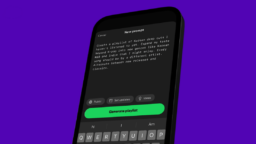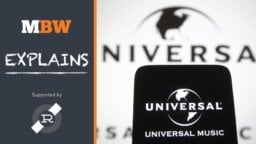We’ve all seen AI perform some impressive feats in recent months and years, from writing poems to offering therapy sessions (and some not-so-impressive feats, like ripping off songwriters and creating deepfakes of celebrities).
But what about AI that can imitate the talents of the best and the brightest working in a given field?
Imagine an algorithm that can design clothes with the flair of Coco Chanel, or develop cars with the style of Marcello Gandini (of Lamborghini fame).
Norwegian AI company Masterchannel has developed something along these lines – in the field of sound engineering.
In mid-December 2023, the company launched an AI “clone” of Grammy-winning sound engineer Wez Clarke.
It’s resulted in a serious engagement boost for the platform: The number of monthly sessions on Masterchannel jumped from 19,000 in November to 25,000 last month, the company says.
Masterchannel users have the option to upgrade their existing subscription plan to include the Wez Clarke clone – which was created in collaboration with (and crucially, with the consent of) the engineer himself.
The firm says that 100% of the additional revenue generated by said subscription upgrade goes to the real-life Clarke.
Masterchannel claims that the Wez Clarke tool “provides everyone from bedroom musicians to professional artists with the opportunity to experience the meticulous decision-making of Clarke during the engineering and mastering process”.
It adds: “As the volume of song-creation is expected to multiply in the future, this ground-breaking approach represents an opportunity for everyone to experience professional audio quality of Grammy Award-winning standards.”
“The clone gives everyone the chance to make their music sound as good as released music, and ultimately they’ll learn how to achieve that professional sound themselves.”
Wez Clarke
Wez Clarke has mixed several hit singles for artists including Beyoncé, Rudimental, Tinie Tempah, Naughty Boy and Little Mix.
He won a Grammy in 2015 for his mix of Clean Bandit and Jess Glynne’s Rather Be.
He licensed his techniques to Masterchannel, which builds AI models somewhat differently than large language models, like ChatGPT, that have become famous over the past year.
Instead of training its AI on vast amounts of data (a practice that has resulted in a number of copyright infringement lawsuits), Masterchannel says it uses “reinforcement learning” to train its AI.
The AI is given a task and allowed to do it how it sees fit, and is then rewarded anytime it gets something ‘right’.
In this way, “Masterchannel has perfected what makes a well-engineered track and has learnt how to mathematically encode that into technical criteria for the system,” the company says.
The idea that the skills of high-performing people in technical fields can now be encapsulated in an algorithm might be worrying to some: If the greatest people can now be immortalized in an app, what room is there for any new talent that comes along?
But Clarke himself sees things differently; in his view, rather than taking sound engineers’ jobs, the new technology allows new sound engineers to learn hands-on from the best.
“It’s great that [new music creators] experience working with a major engineer – I would have loved to have had the opportunity to use something like this when I was just starting out, because it’s a perfect way to learn,” he said in a statement.
“Producers can get so used to the way their music sounds, and not realize how much better it could get.
“The clone gives everyone the chance to make their music sound as good as released music, and ultimately they’ll learn how to achieve that professional sound themselves.”
“[This] clone gives everyone the chance to make their music sound as good as released music, and ultimately they’ll learn how to achieve that professional sound themselves.”
Wez Clarke
Masterchannel’s CTO, Simon Hestermann, says the partnership between Clarke and the AI company is “a great showcase on a business model where new tech and major players can thrive together. The AI clone shows how top-tier engineers can serve the long tail of artists in the industry, a market which previously was not considered profitable for top tier human engineers due to lack of time and ability to pay.”
He adds: “With 100% of the extra revenue going back to the engineer, the AI clone provides revenue for both parties, which is important as creators need to be incentivized for providing their knowledge and effort when working with new technology. Due to Masterchannel’s unique technology and the agreement made with Wez Clarke, the Intellectual property has been preserved and no company or datasets have been exploited.”
Citing recent research from IFPI showing that a solid majority – 74% – of people believe that AI should not be used to clone or impersonate artists without authorization, Masterchannel says its technology “addresses these concerns and demonstrates a model where artists can directly benefit from AI innovations.”
The company adds that its reinforcement learning system represents “a scalable model for AI integration in the music industry.”
“Due to Masterchannel’s unique technology and the agreement made with Wez Clarke, the Intellectual property has been preserved and no company or datasets have been exploited.”
Simon Hestermann, Masterchannel
Masterchannel’s innovation is another sign that some AI developers are listening to concerns about copyright infringement and deepfakes that have been at the heart of the entertainment industry’s efforts to promote regulation of AI technology – and to hold to account those AI developers who use copyrighted materials and the likenesses and voices of artists without permission.
In another sign the AI industry (or at least some of it) is shifting gears towards a more copyright-respecting stance, tech entrepreneur Ed Newton-Rex recently launched the non-profit organization Fairly Trained, which certifies AI models based on their respect for creators’ rights.
Who knows? Maybe the music business might just be able to pull off this ‘ethical AI’ thing after all.Music Business Worldwide





